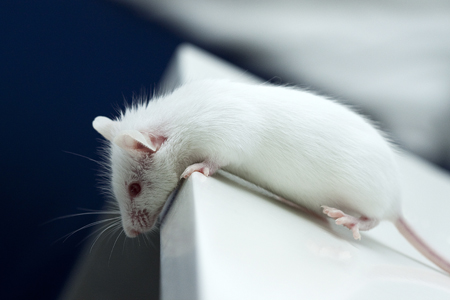Heart Attacks, Surgery Lead to Memory Impairment in Mice
Events like surgery or heart attacks that cause inflammation can lead to cognitive deficits or depression for months or years afterward, even though the direct effects of inflammation wear off within weeks. In a recent study, Natalie Tronson and colleagues subjected mice to surgical heart attack, sham surgery, or no operation, and observed how well they absorbed new learning eight weeks later.
Both male and female mice had impairments in fear learning following surgical heart attacks. Female mice that received sham surgery also showed deficits in fear learning. When the researchers dissected the mice, analyzing their blood and hippocampi after the eight-week period, inflammatory cytokine measures had normalized as expected, but the researchers found other abnormalities.
Intracellular signaling was dysregulated, and there had been epigenetic changes in cells of the hippocampus. (Epigenetic changes refer to those that change the structure of DNA, such as how tightly it is wound, rather than its sequence. For example, the addition of acetyl groups to DNA or the histones around which it is wound.) The researchers observed increased histone acetylation and phospho-acetylation following the heart attacks.
The researchers concluded that a systemic inflammatory event, such as heart attack or surgery, can cause long-term memory impairment and changes in mood through epigenetic mechanisms. They compared the findings to those of other studies in which normal aging and memory-impairing treatments such as chemotherapy had also been associated with increases in histone acetylation or decreases in histone deacetylase activity.
Early Life Stressors Lead to Lifetime Increase in Inflammation in Mice
Stressors in early life can contribute to the risk of developing mood disorders. Given that many treatments for mood disorders work by blocking the serotonin 5-HT transporter, Nicole Baganz and colleagues designed a study to see whether an early life stressor, in this case maternal separation, would affect immune processes that in turn affect serotonin signaling.
In this study as in many before it, mice that were removed from their mothers exhibited behaviors that resembled human anxiety and depression. They were also found to have elevated messenger RNA for several inflammatory cytokines (including IL-1beta and IL-6) in their brain and blood. Mice that had a gene for the interleukin-1 receptor (IL-1R) removed exhibited neither the depressive behavioral effects nor the changes in cytokine levels following maternal separation, showing that the IL-1R gene plays a necessary role in the signaling process that leads to this type of depression. Levels of the stress hormone corticosterone in the blood did not differ in the mice with and without the IL-1R gene.
The researchers concluded that early life stressors can cause lifelong changes in inflammatory cytokine levels in mice.
Young Rats That Witness Maternal Abuse Show Depression-Like Behavior in Adulthood
Rodents that are subjected to social defeat (being overpowered by a bigger, more aggressive animal) develop a syndrome that resembles human depression—they avoid social interaction, lose interest in sucrose, and do less exploring of new places or other animals. A recent finding showed that even witnessing the social defeat of a peer was enough to bring about the depressive behaviors. The same researchers, led by Samina Salim, recently found that young rats (aged 21–27 days) that witnessed their mother go through the trauma of social defeat showed depression-like behavior themselves as adults (at age 60 days).
The rats saw their mothers defeated by the larger rat every day for seven days. As adults, those who witnessed this abuse exhibited depression-like behavior compared to rats of the same age and gender that had not witnessed abuse. The depressive rats gave up more quickly on a test of forced swimming. Male rats showed great depression-like behavior than female rats.
It has been estimated by the American Psychological Association that 15.5 million children in the US witness physical or emotional abuse of a parent (usually their mother). Children who witness domestic violence often show symptoms of post-traumatic stress disorder (PTSD). This rodent research may lead to a better understanding of the consequences of witnessing trauma in childhood, and potential treatments that could help.
Editor’s Note: These data show that rats have something like empathy, and that the psychological aspects of stress (including verbal abuse in humans and witnessing another’s abuse in rodents) may have profound and lasting consequences on behavior.
Mild Traumatic Brain Injury and Deployment Associated with Inflammatory Abnormalities in Veterans of the Iraq and Afghanistan Wars
Mild traumatic brain injury from improvised explosive devices is an injury particular to veterans of the wars in Iraq and Afghanistan. As has been seen in some athletes who sustain repeated mild traumatic brain injuries, such as boxers and football players, neurodegenerative dementias such as chronic traumatic encephalopathy can follow these repeated brain injuries. Researchers are hoping to identify biomarkers that would help in the diagnosis and monitoring of repeated blast-induced mild traumatic brain injury. Researcher Elaine Peskind and colleagues have determined that both deployment to these wars and mild traumatic brain injuries received there are associated with increased inflammatory cytokines in cerebrospinal fluid.
In the study, veterans who had been deployed to Iraq or Afghanistan and had received mild traumatic brain injuries were compared to veterans who were deployed but who were not similarly injured and community participants who had neither been deployed nor experienced a brain injury. The average number of concussion-inducing blasts veterans in the first group had experienced was 14, with the latest occurring an average of four years prior to the study.
Inflammatory cytokine IL-7 was elevated in the spinal fluid of those veterans who had sustained brain injuries. IL-6 was higher both in those deployed and in those who sustained blasts. Eotaxin and granulocyte colony stimulating factor were higher in all of the veterans who had been deployed.
These cytokine abnormalities could account for behavior and cognitive difficulties associated with traumatic brain injury. The researchers concluded that both deployment and mild traumatic brain injury were associated with neural damage and neuroimmune responses.
Editor’s Note: Michael E. Hoffer et al. reported in the journal PLosOne in 2013 that veterans with blast-induced mild traumatic brain injury had a better acute outcome when they were given the antioxidant N-acetylcysteine (NAC) within the first 24 hours after the trauma. It is interesting to speculate whether this could be explained by NAC’s anti-inflammatory effects, its enhancement of another antioxidant (glutathione), or its ability to increase glial glutamate transporters.
Researcher Dewleen Baker reported in a personal communication to this editor (Robert Post) that in her patients, traumatic brain injury was also associated with white matter abnormalities, and that these injuries conveyed an increased risk of developing PTSD as well.
Loving-Kindness Meditation Can Lengthen Telomeres in Women
Telomeres sit at the end of DNA strands and shorten with each cell replication. Shorter telomeres are associated with aging and an increase in multiple medical and psychiatric disorders, while some healthy behaviors including exercising, eating healthy, avoiding smoking, and even being married can help maintain telomere length. New data from researcher Elizabeth Hoge and colleagues suggests that a particular type of meditation can lengthen telomeres.
Previous research has found that three months of full-time meditation increased telomerase, an enzyme that repairs telomeres. Loving-Kindness meditation, which comes from the Vipassana Buddhist tradition and focuses on positive intentions, unselfish kindess, and warmth towards all people, has been found to produce positive effects in individuals who practice it, including increasing positive emotions and sense of purpose, and bringing about improvement in physical symptoms including headaches, nasal congestion, and weakness. Hoge and colleagues hypothesized that people who practice Loving-Kindness meditation would have longer telomeres than control participants of the same age, gender, education level, and experience of depression.
Participants who practiced Loving-Kindness meditation had been doing so near-daily for at least four years, and averaged 512 lifetime hours of this particular type of meditation, and 4,927 lifetime hours of any type of meditation.
The researchers found a trend toward longer relative telomere length in the Loving-Kindess meditation group compared to the control group, and significantly longer telomeres in women who meditated than in women who did not. The researchers conclude that meditation may have a positive effect on mortality.
Other habits that are focused on others, such as caring for a spouse, volunteering in the community, and practicing compassion, forgiveness, and altruism have been found to have health benefits. In a 2012 longitudinal study of elderly participants by Loren Toussaint et al. in the Journal of Behavioral Medicine, forgiveness was associated with longevity. Thaddeus W.W. Pace et al. reported in a 2009 article in Psychoneuroendocrinology that compassion meditation reduced levels of certain inflammatory markers.
Editor’s Note: People with affective disorders or at risk for them should consider making some of these positive lifestyle practices part of their daily routine.
Childhood Adversity Associated with Shorter Telomeres
 Telomeres sit at the end of DNA strands and shorten with each cell replication. Shorter telomeres are associated with aging and an increase in multiple medical and psychiatric disorders. New research draws connections between the production of mitochondrial DNA, telomere length, the experience of childhood adversity, and mental illness.
Telomeres sit at the end of DNA strands and shorten with each cell replication. Shorter telomeres are associated with aging and an increase in multiple medical and psychiatric disorders. New research draws connections between the production of mitochondrial DNA, telomere length, the experience of childhood adversity, and mental illness.
Researcher Audrey Tyrka and colleagues divided 290 healthy adults into four categories based on whether or not they had experienced adversity in childhood and whether they had been diagnosed with a mental illness in their lifetime, including depression, anxiety, and substance abuse. The researchers also analyzed the participants’ telomere lengths and the copy number of their mitochondrial DNA. Both stressful events in childhood (such as maltreatment or the loss of a parent) and a history of mental illnesses (depression and anxiety) were associated with shorter telomeres and higher mitochondrial DNA copy numbers, a measure of cellular aging. Substance abuse was associated with higher mitochondrial DNA copy numbers.
Editor’s Note: This research replicates earlier findings that adversity is associated with shortening telomeres. The finding that mitochondrial DNA could play a role in the long-term effects of early life adversity and mental illnesses is new.
Maternal Anxiety Affects Information Filtering in the Infant Brain, Choline Could Help
 Sensory gating is a process by which the brain filters out unimportant information, to avoid flooding higher cortical centers with irrelevant stimuli. New research from Randal Ross and colleagues shows that infants of mothers with anxiety have deficits in the way their brains inhibit response to this type of irrelevant information.
Sensory gating is a process by which the brain filters out unimportant information, to avoid flooding higher cortical centers with irrelevant stimuli. New research from Randal Ross and colleagues shows that infants of mothers with anxiety have deficits in the way their brains inhibit response to this type of irrelevant information.
Mothers who were rated higher on the trait of anxiety had paradoxically lower levels of the inflammatory cytokine interleukin 6 at week 16 of their pregnancy, and their one-month-old infants showed more deficits in sensory gating. The reasons for these relationships requires further investigation.
Choline is a nutrient found in liver, muscle meats, fish, nuts, and eggs, and it may help. In a 2013 article in the American Journal of Psychiatry, Ross and colleagues showed that the supplement phosphatidylcholine (which converts to choline), taken during the second and third trimesters of pregnancy (at doses of 6300 mg/day, the equivalent of about three eggs) and followed up with 700 mg/day in the infant, led to improvements in sensory gating in the infants. These infants went on to have fewer behavioral problems as toddlers.
Ross and colleagues suggest that pre- and post-natal choline supplementation may be able to reverse the effects of maternal anxiety on infants. The researchers believe it could be helpful in the prevention of schizophrenia, as insufficient cerebral inhibition (decreased sensory gating) is a characteristic of that illness as well.
If You Are Depressed After a Heart Attack, Treat the Depression
 Depression is common following heart attacks, and it can complicate recovery. A recent study by Jae-Min Kim and colleagues investigated the safety of treating depression with escitalopram in people recovering from acute coronary syndrome. In a 2015 article in the Journal of Clinical Psychiatry, they reported that 217 people with depression and acute coronary syndrome were randomized to receive either escitalopram (in flexible doses ranging from 5–20 mg/day) or placebo for 24 weeks. Patients who received escitalopram saw more improvement in their depression on a variety of scales, and also showed improvements in social and occupational functioning. There were no adverse cardiac effects from escitalopram, though some people taking it did experience dizziness.
Depression is common following heart attacks, and it can complicate recovery. A recent study by Jae-Min Kim and colleagues investigated the safety of treating depression with escitalopram in people recovering from acute coronary syndrome. In a 2015 article in the Journal of Clinical Psychiatry, they reported that 217 people with depression and acute coronary syndrome were randomized to receive either escitalopram (in flexible doses ranging from 5–20 mg/day) or placebo for 24 weeks. Patients who received escitalopram saw more improvement in their depression on a variety of scales, and also showed improvements in social and occupational functioning. There were no adverse cardiac effects from escitalopram, though some people taking it did experience dizziness.
Inflammation is Associated with Cognitive Dysfunction in Children with Bipolar Disorder
Researcher Ben Goldstein reported at the 2014 meeting of the American Academy of Child and Adolescent Psychiatry that children with bipolar disorder have levels of inflammatory markers in the same range as people with inflammatory illnesses, such as rheumatoid arthritis. In his research, increases in the inflammatory marker c-reactive protein (CRP) occurred in proportion to the severity of manic symptoms in the children.
Goldstein also discussed cognitive dysfunction, which is often seen early in the course of childhood onset bipolar disorder. Goldstein described studies showing that this type of cognitive dysfunction consists of a decrease in reversal learning, a measure of cognitive flexibility. Elevated CRP was significantly associated with deficits in a child’s composite score for reversal learning.
Together these data suggest that inflammation could play a role in disease disability and cognitive dysfunction in childhood bipolar disorder.
Childhood Maltreatment Leads to Inflammation and Depression in Adulthood
Researcher Andrea Danese discussed the influence of childhood maltreatment on inflammation in a symposium at the 2014 meeting of the American Academy of Child and Adolescent Psychiatry. Danese indicated that inflammation is part of the normal immune system, which includes the blood brain barrier, recognition of self- versus non-self proteins, activation of cytokines and endothelial cells, and response by phagocytes and acute phase proteins. In an acute phase inflammatory response, the liver secretes proteins including c-reactive protein (CRP) and fibrinogen into the blood, where their levels can be measured.
Normal amounts of inflammation can be protective, while excessive or persistent inflammation can be damaging and pathological. The inflammatory cytokines interferon gamma and tumor necrosis factor (TNF alpha) induce an enzyme called indoleamine oxidase (IDO) that shunts the amino acid tryptophan away from its normal path, which yields serotonin, so that it instead yields kynurenine and then kynurenic acid, which inhibits the action of glutamate at NMDA receptors. Kynurenine can also be hydroxylated and turned into quinolinic acid, which activates glutamate NMDA receptors and causes toxicity.
In addition, inflammatory cytokines such as interleukin six (Il-6) can cross the blood brain barrier and directly influence neurotransmission. Meta-analyses have shown that inflammatory markers CRP, IL-6, IL-1, and IL-1 Ra all increase significantly in depression. A direct demonstration of the relationship between inflammation and depression is the finding that when hepatitis C is treated using the inflammatory treatment interferon gamma, there is about a 30% incidence of depression, which responds to the antidepressant paroxetine.
Stress can also increase the activity of the sympathetic nervous system, driving inflammation, and decrease parasympathetic activity, resulting in further inflammation. In addition, glucocorticoid receptor resistance can develop, enhancing depression, and increasing inflammation. Thus there are multiple ways inflammation can develop.
Danese described a study from New Zealand in which 1000 participants were observed over several decades—from childhood through age 38. The small percentage of participants who experienced maltreatment as children (aged three to eleven) showed a linear increase in CRP in adulthood as a function of their histories of previous child maltreatment. The maltreatment included parental rejection in 14%, sexual abuse in 12%, harsh discipline in 10%, changing caretakers in 6%, and physical abuse in 4%. Childhood maltreatment was also associated with some unfortunate outcomes in adulthood, including lower socioeconomic status, more major depression, more persistent depression, more cardiovascular risk, and more smoking. In other studies, Danese found that compared with controls, patients with depression alone, and patients with maltreatment alone, a greater number of patients with both depression and maltreatment (about 30%) had elevated CRP.
Danese noted that in a study by Ford et al. (2004), recurrent depressions, but not single depressions, were also significantly associated with increased CRP. In a meta-analysis by Nanni et al. in the American Journal of Psychiatry in 2012, Danese and colleagues found that across multiple studies, childhood maltreatment was associated with a twofold increase in the incidence of depression and a twofold increase in the persistence of depression (chronic depression or treatment resistance). The traditional optimal treatment for depression, combined psychotherapy and pharmacotherapy, was also significantly less effective in those with histories of childhood maltreatment. However, psychotherapy alone was equally effective in those with and without childhood maltreatment.
Together these data suggest that childhood maltreatment, partly through an inflammatory pathway, results in multiple difficulties in adulthood, including depression and treatment resistance. These data speak to the importance of attempting to prevent maltreatment in the first place, and ameliorating its consequences should it occur.
Editor’s Note: In a 2014 article in the Journal of Nervous and Mental Disorders, this editor Robert Post and colleagues reported that childhood adversity (verbal, physical, or sexual abuse) is associated with increases in medical comorbidities in adult patients with bipolar illness, and it is likely that inflammation could play a role in some of these medical conditions.








